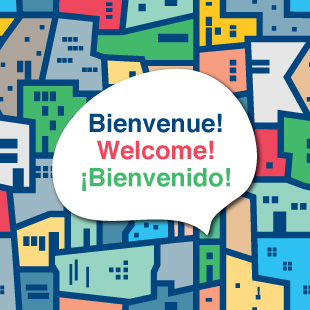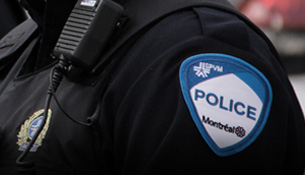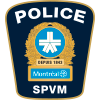
Newcomers and Asylum Seekers
Immigrating to Montreal or living here during your asylum application process is probably one of your biggest life-changing projects. The Service de police de la Ville de Montréal (SPVM) welcomes you. You can rely on our support during this period of change and adaptation.
In Canada, the Canadian Charter of Rights and Freedoms recognizes that the law makes no distinctions between persons and applies equally to everyone. Everyone has the right to the same protection and the same benefit of the law, regardless of discrimination, including discrimination based on race, national or ethnic origin, colour, religion, sex, age or disability. Violence in any form is banned.
The SPVM is a municipal police service. Police officers maintain the safety of citizens and enforce current laws and regulations. In this way, they protect citizens' lives and property, maintain peace and public safety, prevent and combat crime. When a situation requires police services, feel free to contact them.
On this page, you will find practical information aimed at raising your awareness to, in particular:
- the role of police officers and the services they offer for your safety;
- certain aspects of the Charter of human rights and freedoms, laws and municipal regulations;
- the prevention of fraud and theft;
- the help resources available to you.
You can also consult the leaflet below in different languages:
French (PDF)
English (PDF)
Spanish (PDF)
SPVM OVERVIEW
The SPVM is the second largest municipal police department in Canada.
- It serves the entire Island of Montréal, an area of 496 km2, which had about two million residents in 2016.[1]
- It has a police station in 30 different sectors (also called a neighbourhood police station), one unit at the airport and another in the metro.
- Nearly 645,000 Montréal residents were born abroad, more than a third of Montrealers.[2]
About 6,000 civilian employees and police officers work together to respond to the safety needs of the public.
- Of the approximately 4,500 police officers, 66% are male and 34% are female police officers.
- Of this number, 13% of police officers are from visible, ethnic and indigenous minorities.
Code of ethics of Québec police officers
Police officers carry out their work respecting the rights and freedoms of citizens. A code of ethics determines their duties and standards of conduct in their relations with the public in the exercise of their functions.
If you commit an offence or break the law, the police must intervene and exercise powers provided by law or recognized by the courts.
If you disagree with a police intervention, you have the right to contest it or file a complaint at any time with the SPVM Bureau du service aux citoyens or the Bureau du Commissaire à la déontologie policière.
To find out more:
Discover the SPVM: Organization - Discover police work
Find your neighbourhood police station
Policy on Police Checks
IN CASE OF EMERGENCY: 9-1-1
If your life, your health or your safety is in danger or that of another person, you should immediately call 9-1-1. This phone number can be called for no charge from anywhere, even using a cell phone without a plan or a payphone.
When the emergency call dispatcher responds, you must clearly state the word “Police”, “Fire” or “Ambulance”, in French or in English, to make sure we send you the right first responders.
911 is the phone number that should be dialled from anywhere on the Island of Montréal to contact emergency services such as:
- Police;
- Fire department;
- Ambulance (Urgences-santé);
- Hydro-electricity (Hydro-Québec);
- Natural gas (Énergir);
- Public works;
- Coast guard.
In case of emergency, call 9-1-1. However, it is not an information service.
If the matter is not urgent, you can contact your neighbourhood police station (PDQ) directly by dialling 514-280-01XX (XX corresponds to the number of the neighbourhood police station). To know or write to the neighbourhood police station in your area, go to: spvm.qc.ca
Do not hesitate to report any incident to the police that may threaten your safety or that of another person, regardless of your status. Rest assured that any request made to the Service de police de la Ville de Montréal will not affect your procedures as a newcomer or asylum seeker in Canada because the police are responsible for ensuring that your right to live freely and safely is respected.
To find out more:
9-1-1
FUNDAMENTAL RIGHTS AND FREEDOMS
“All individuals are equal in worth and dignity, regardless of age, sex, ethnic or national origin, race or colour, language, religion, sexual orientation, gender identity or expression, civil status, social condition, political convictions, pregnancy, handicap or the use of any means to palliate a handicap.”[1]
Parental authority
In Québec, parents have rights and obligations toward their children. With regard to their child, fathers and mothers have the right and the duty of care, supervision and education. They have to feed and care for their child. This parental authority gives them the right to make all the necessary decisions in their child's best interest.
Regardless of the circumstances, it is strictly forbidden to punish a child in a way that could cause injury, with objects such as a belt, a ruler, a shoe or any other object, by slapping and hitting them over the head, or subjecting them to degrading or inhuman treatment[2].
When parents do not act in the best interests of their children, the Youth Protection Act applies. If the safety or development of a child under 18 years old is considered compromised, this situation must be reported to the Director of Youth Protection (DYP).
Examples
- Child left home alone
- Child under 12 years old not attending school
No to violence!
Violence is forcing a person to act against their will, using force, intimidation or fear to control or dominate them. Violence can be physical, verbal, sexual, psychological and economic. Any act of violence could lead to criminal charges.
Domestic and intrafamily violence
Any form of violence within a couple or family could result in criminal charges. If you are a victim of domestic or intrafamily violence, you do not have to tolerate such a situation. We must break the silence and report these situations. Don’t be afraid to call the police. Dial 9-1-1.
SPVM police officers come to the aid of anyone who is a victim of violence. Their first duty is to rescue the victim and ensure their safety and the safety of their loved ones. If you are a victim, they will take you to safety. In collaboration with social services, they will direct you to resources that will help you.
If you witness criminal acts committed in a marital, family or other context, dial 9-1-1 immediately. It’s for the victim’s safety.
Hate crimes or incidents
Hate crimes: Crime motivated or suspected to be motivated by hatred
Hate incident: Non-criminal act that may affect the sense of safety of a person or a group of people
A hate crime and a hate incident can be based race, national or ethnic origin, language, colour, religion, sex, age, mental or physical disability, sexual orientation, or any similar factor.
Call 911 immediately if you are the victim or witness of a hate crime.
To report a hate incident, click here to complete an online police report.
To find out more:
Hate crime and hate incident
Director of Youth Protection (DYP)
Domestic and intrafamily violence
ROAD SAFETY
Driving and mandatory documents
To drive in Quebec, you must have in your possession these three valid documents, namely: a driver's license, the registration certificate and proof of civil liability insurance for the vehicle you are driving.
For any questions regarding driver's licenses and driving in Québec, please consult the Tourists and newcomers section on the website of the Société de l'assurance automobile du Québec (SAAQ). The latter is the entity responsible for issuing driver's licenses and registration in Quebec.
Driving is regulated by the Highway Safety Code and fines are linked to each offense.
To find out more:
Alcohol or Drug Impaired Driving
Traffic Rules for Drivers
Traffic Rules for Cyclists
Traffic Rules for Pedestrians
Société d’assurance automobile du Québec (SAAQ)
PREVENTION TIPS
Housing
A landlord asks you to pay a large amount of money to reserve housing. What should you do?
- Ask the landlord to visit the apartment or house you will be renting (not the apartment or house next door or similar housing).
- Do not give anyone cash without obtaining a receipt and signing a lease with the right address and the apartment or house number you visited.
- If you hand over cash to reserve housing, make sure that you do not pay more than the first month’s rent.
Immigration and asylum applications
An immigration representative calls you and asks you for money or some kind of payment to speed up your application process. What should you do?
- Ask questions. Take your time.
- Before you do anything or give money, find out more information. Ask people and workers you trust for recommendations.
- Make sure this representative is licensed to practice and give advice.
- If you are a victim of fraud, please contact the police as soon as possible.
Many websites provide paid immigration or citizenship services. Some of these websites give you access to authorized representatives, as they are members of the Immigration Consultants of Canada Regulatory Council.
Other websites may offer you false guarantees such as jobs or fast-track processing of your application: beware! If you choose a paid representative who is not authorized, your application may be returned. Be careful!
You do not need to hire a representative, a consultant or a lawyer to help you fill out your application; it’s your decision. If you follow the instructions in the application guides, you will be able to fill out the required forms and submit them as required.
To find out more:
Asylum Seekers (PRAIDA)
Fraud - Apartment rental
Identity theft
HELP RESOURCES
Intake and integration
Asylum seekers (PRAIDA)
Interpreters are available in many languages
Monday to Friday, 8.00 a.m. to 5.00 p.m.
514 484-7878, extension 65
ciussswestcentral.ca/programs-and-services/lifestyle-habits-and-prevention/asylum-seekers-praida/
Driving
Société de l'assurance automobile du Québec
Driver’s licence, vehicle registration certificate and health insurance card
514-873-7620
saaq.gouv.qc.ca/en/
Fraud and theft
Canadian Anti-Fraud Centre
To report fraud
1-888-495-8501
antifraudcentre-centreantifraude.ca
Immigration
Gouvernement du Québec
Ministère de l’Immigration, de la Francisation, et de l’Intégration
Newcomer services
514-864-9191
immigration-quebec.gouv.qc.ca/en/home.html
Government of Canada
Immigration, Refugees and Citizenship Canada
canada.ca/en/immigration-refugees-citizenship.html
Immigration Consultants of Canada Regulatory Council
Legal information and redress
Aide juridique
Free legal services
514-864-2111
aidejuridiquedemontreal.ca
Bureau du Commissaire à la déontologie policière
Rights and remedies for contesting a police intervention or filing a complaint
514-864-1991, extension 0
comite.deontologie.gouv.qc.ca/en/the-comite.html
Bureau du service aux citoyens du SPVM
Commission des droits de la personne et des droits de la jeunesse Québec
Your rights and remedies under the Charter
1-800-361-6477
cdpdj.qc.ca/en
Éducaloi
Québec laws and regulations
educaloi.qc.ca/en/
Parenting: educaloi.qc.ca/en/categories/parenting/
Office de la protection du consommateur
Your consumer rights and redress
514-253-6556
opc.gouv.qc.ca
Housing
Tribunal administratif du logement
Rights and obligations of tenants and landlords
514-873-2245
tal.gouv.qc.ca/en/
Referrals to community and social services
211 Grand Montréal
Montreal Island directory of community services
Multilingual (200 languages)
Call 2-1-1
211qc.ca/en/
Psychosocial support
Info-Social 811
Free and confidential telephone consultation service
24 hours/7 days a week
To quickly reach a psychosocial worker
Call 8-1-1
quebec.ca/en/health/finding-a-resource/info-social-811
SOS domestic violence hotline
Intake, assessment, information, awareness raising, support and referral services
Services are free, anonymous and confidential (domestic and family violence)
24 hours/7 days a week
1-800-363-9010
sosviolenceconjugale.ca/en
In an emergency, call 9-1-1.
spvm.qc.ca



